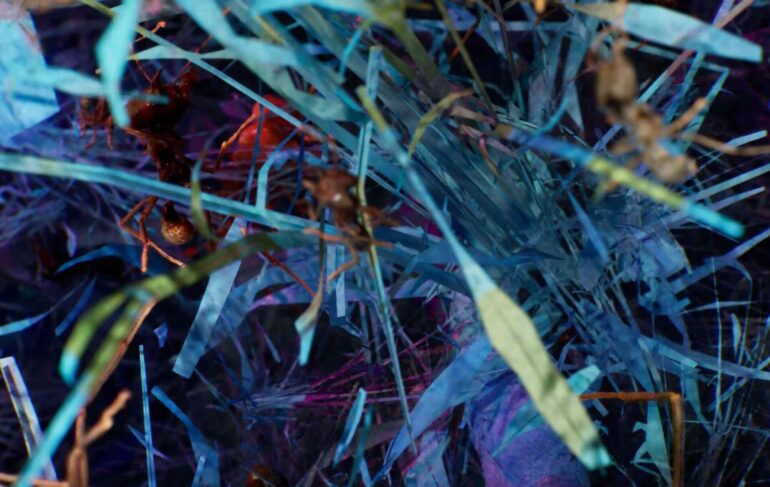TL;DR:
- Imperial College London introduces replicAnt, a groundbreaking AI tool for tracking animal behavior.
- The tool streamlines the creation of training images, reducing manual annotation efforts.
- ReplicAnt’s automation can potentially enhance the speed and robustness of AI applications in animal research.
- Lead author Fabian Plum highlights the tool’s ability to lower entry barriers for biologists and optimize research.
- The tool builds upon the success of scAnt, a 3D scanner for precise animal modeling.
- Neural networks trained on replicAnt images efficiently recognize and track animals in various environments.
- ReplicAnt holds promise for simplifying data collection in biology and has potential applications in character animation for film and gaming.
- Funding for this project comes from Imperial’s President’s PhD Scholarship and the European Research Council.
Main AI News:
In the realm of biology research, where the study of collective and individual animal behavior demands meticulous data collection from large populations, the integration of artificial intelligence (AI) has ushered in a new era of efficiency and productivity. Imperial College London introduces a groundbreaking machine learning tool, replicAnt, poised to revolutionize the field and accelerate the adoption of AI in biological sciences.
Biologists have long grappled with the arduous task of observing and recording the behavior of numerous animals, a process that generates a staggering volume of data. Emerging machine learning tools offer a promising solution, enabling researchers to process this data with greater speed and reduced workload. Enter replicAnt, a transformative tool designed to simplify and streamline the creation of training images for machine learning applications, starting with insects.
Traditional AI-enabled tools necessitate painstaking manual annotation of hundreds of frames to build a reference database for machine learning algorithms. ReplicAnt, however, takes a quantum leap by automating the generation of thousands of annotated images with a simple mouse click. It seamlessly incorporates variations in species and environments, potentially enhancing the speed and robustness of AI tools in animal research.
Published in the esteemed journal Nature Communications, this innovative work is led by Fabian Plum, a PhD researcher at Imperial College London’s Department of Bioengineering. Plum asserts, “Setting up studies involving large animal populations and adapting to new tools can be incredibly time-consuming. replicAnt significantly reduces the barriers for biologists looking to harness machine learning for optimizing their research.“
ReplicAnt builds upon the success of the research team’s prior creation, scAnt – a 3D scanner renowned for its ability to capture small animals with meticulous precision, producing high-resolution 3D models. These 3D models, seamlessly integrated into replicAnt, serve as the foundation for generating training images used to detect and track animals in laboratory and natural settings. This integration liberates researchers from time-consuming tasks, fostering a streamlined workflow.
To showcase replicAnt’s capabilities, researchers harnessed neural networks – advanced algorithms capable of recognizing intricate relationships in data – to learn from the images. This enabled the neural networks to identify individual animals and track their movements across diverse environments with unprecedented efficiency, reducing the need for labor-intensive hand-labeling of real images by a significant margin.
Fabian Plum emphasizes the broader significance of this technological advancement, stating, “Understanding animal behavior, particularly in the context of our changing climate, is paramount. We envision our tool as a catalyst for simplifying and expediting the data collection process, offering invaluable insights into the animal kingdom.“
Beyond biology research, replicAnt holds promise for a myriad of applications, including the utilization of real-time movement data to enhance character animation in film and video games.
This pioneering project received funding from Imperial’s President’s PhD Scholarship awarded to Fabian Plum, as well as support from the European Research Council (ERC) under the European Union’s Horizon 2020 research and innovation program, led by Dr. David Labonte at the Department of Bioengineering. As AI continues to reshape the landscape of biological research, replicAnt stands at the forefront, offering a powerful tool to unlock new frontiers in our understanding of the natural world.
Conclusion:
ReplicAnt’s emergence signifies a transformative shift in animal research, offering efficiency and automation to biologists. Its potential applications extend beyond research, suggesting a significant market potential for AI-driven tools in various scientific and creative industries. The market for AI solutions in biology and related fields is poised for growth as replicAnt sets new standards for data collection and analysis.

